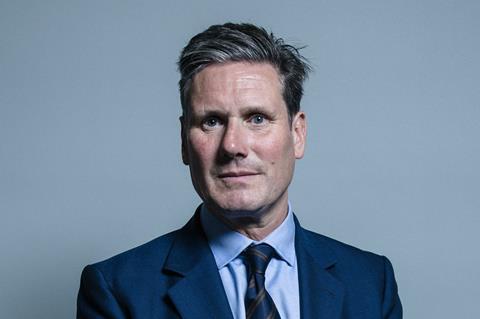If the polls are to be believed, a KC will be PM by the end of the year.

Sir Keir Starmer would not be the first lawyer to become prime minister, of course: pictures of Asquith, Lloyd George, Attlee, Thatcher and Blair already line the staircase at No 10. He would not even be the first KC: Spencer Perceval was a silk and so was Asquith.
But Starmer would be the most senior practising lawyer in modern times to lead the UK government. And although never a minister, he headed the equivalent of a government department during his five years at the Crown Prosecution Service. Even so, it would be rash for lawyers to expect any special favours from a government facing such widespread challenges.
They can be summed up in a single word: underinvestment. ‘Nothing seems to work in Britain,’ the Labour leader says in the introduction to his party’s most recent policy paper. But Let’s Get Britain’s Future Back promises ‘tough fiscal rules with economic stability at their heart’ – so putting up taxes is a non-starter.
How, then, could a Labour government remedy what it describes as a ‘collapse of law and order’ with ‘a pitifully low charge rate, soaring court backlogs and prisons so full that violent criminals are being let out early’?
There will be more detectives to tackle fraud, the party promises, more prosecutors to bring criminals to justice and new prison places that the Conservatives failed to deliver.

Labour’s mission, it says, is to rebuild public confidence. ‘To protect the public we need serious reforms to policing and the criminal justice system so that standards rise, delays are tackled, new technology is brought in, trust is rebuilt, more crimes are solved, more criminals face justice and serious offenders are put behind bars.’
All this is said to be ‘fully funded’. But where will the money come from?
One promise is to cut wasteful police spending. At present, each force buys its own equipment. The shadow home secretary said last week that this leads to ‘huge variations in price for everything from batons to police vehicles, with some forces spending twice as much as others’. Yvette Cooper has promised to set up a national police savings body ‘mandating shared procurement’.
Depending on what that means in practice, it could either add a level of bureaucracy or save a limited amount of money. But if there are to be truly radical reforms, we must start with the prisons.
Labour would be right to press ahead with the current prison building programme; old prisons in city centres need to be replaced so their sites can be sold off. And nobody would want to see violent criminals being let out early.
But the party’s key pledge is to ensure ‘more criminals face justice and serious offenders are put behind bars’. What I hope that means is that serious offenders will be the only criminals put behind bars. Others will face justice by being punished in the community.
Labour’s starting point should be the sentence of imprisonment for public protection. This week, the senior coroner for Milton Keynes told the prisons minister that he must prevent future deaths in prison. Tom Osborne wrote to Edward Argar MP about a prisoner whose treatment he described as ‘inhumane and indefensible’.
Scott Rider was given an indefinite sentence in 2005 with a minimum term of 23 months. He had served more than 17 years when he took his own life at Woodhill prison in June 2022. According to the prisons ombudsman, Rider had disengaged with the parole process because he felt hopeless about the prospect of release. ‘If action is not taken to review all prisoners sentenced to imprisonment for public protection,’ said the coroner, ‘there is the risk of further deaths occurring.’
Lord Blunkett, the Labour home secretary who devised the IPP sentence, said this week that it was his ‘biggest regret’ in government. But a managed release of all remaining IPP prisoners – nearly 3,000 – is only the starting point.
I reported here in March that Alex Chalk’s Sentencing Bill, which was given a second reading on 6 December, had stalled. Five months on, it has clearly lapsed. The bill would have introduced a presumption that short sentences – of 12 months or less – would be suspended unless there were exceptional circumstances. That proposal should be reinstated along with others designed to reduce the prison population.
More guilty pleas will reduce pressure on the courts. Locking up fewer offenders will release funds that could be better spent on community penalties and rehabilitation. Court backlogs would start to come down because there would be fewer contested trials.
If prisons are the key, perhaps only a political leader with a strong majority and deep experience of the criminal justice system can unlock the door.
joshua@rozenberg.net































3 Readers' comments